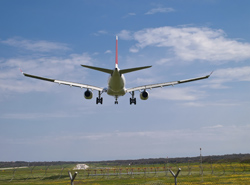Testing smooth and eco-friendly aircraft descent
The aeronautics industry is committed to reducing the environmental impact of its operations. One pillar of dedicated efforts is the Clean Sky Joint Technology Initiative (JTI), a partnership with the EU to speed technological breakthroughs and decrease time-to-market of cleaner solutions tested on full-scale flying model simulators (FMSs) as well as test flights. Three prominent European companies joined forces to deliver an FMS to test promising technologies and techniques related to continuous descent arrival (CDA). CDA is an airport approach methodology designed to reduce aircraft noise, fuel consumption and emissions by means of a continuous descent and is fully in line with Clean Sky objectives. With EU funding of the project 'Novel continuous descent simulation test support' (NOCONDES), team members developed an FMS with a multi-parameter guidance with time and energy management (MPG–TEMO) algorithm and an associated human machine interface (HMI). Nine experienced pilots participating in over 100 successful simulation experiments provided valuable feedback through pilot questionnaires. Analysis facilitated evaluation and recommendations for improvements in the simulator itself, the procedures, the HMI and the MPG–TEMO concept. Overall, partners and pilots concluded that MPG–TEMO is the future of CDA. It is also highly compatible with automation. NOCONDES has made an important contribution to the joint goals of the EU and the aerospace community to reduce the environmental impact of flight. With realistic assessment of the simulator by experienced end-user pilots, the team is in an excellent position to further improve the FMS functionalities, leading to the development of greener commercial aircraft and operating procedures.



